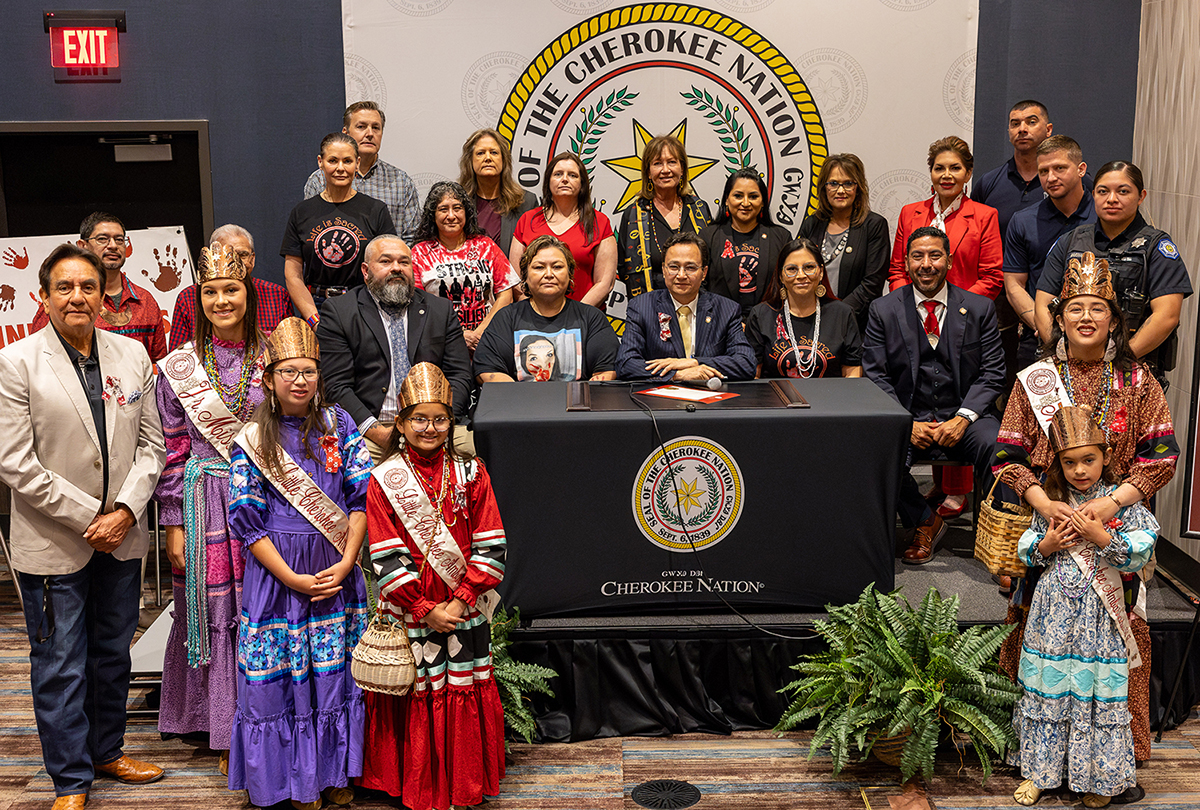TAHLEQUAH, Okla. – Cherokee Nation leaders gathered Friday, May 2, to acknowledge the month of May as Missing and Murdered Indigenous Persons Awareness Month in the tribe.
Principal Chief Chuck Hoskin Jr. joined tribal leaders and MMIP advocates to sign a proclamation acknowledging the ongoing crisis surrounding missing and murdered Indigenous persons across the country. There are 880 Native missing or murdered Indigenous persons cases logged in the National Missing and Unidentified Persons System (NamUs), and the Oklahoma State Bureau of Investigation lists 88 missing Natives, including a number of Cherokees, though it is believed that far more cases often go unreported.
“Policies that dismantle tribal governments by executive actions, military action or congressional action lead to circumstances in which Native peoples are valued less – particularly when they’re in need of the most help. That’s why we must examine the origin story of this crisis and acknowledge that shackling tribal nations for generations kept us from keeping our brothers and sisters, our aunts and uncles, our sons and daughters, safe,” Chief Hoskin said. “Today, we must continue to make progress in Indian Country, opening opportunities to govern ourselves and take actions that protect Native people and help bring justice to those who are missing or who have fallen victim to any number of injustices. We must continue to raise our voices for this cause and reach out to our friends, neighbors and partners across local, state and federal agencies to make substantive changes.”
Friday’s event brought together Cherokee Nation, the Oklahoma State Bureau of Investigation, MMIP families and grassroots advocates to discuss the issues surrounding missing and murdered Indigenous peoples and crucial work to shed more light on MMIP cases.
“It’s likely there are 3 million Indigenous people who have experienced violence. The way that colonialism, systemic injustice and historical trauma has contributed to this ongoing crisis, this ongoing epidemic, is immeasurable,” said District 2 Councilor Dr. Candessa Tehee. “Survivors are often treated with skepticism, and that’s one way we fail individuals and perpetuate cycles of violence. We need to educate and empower not only ourselves to fight for justice, to reclaim that future, to protect our children and to bring them home, we also have to educate the larger mainstream, non-Indian community in which we are situated. I’m proud to be part of a Nation where the legislative and executive branch work together along with a strong judiciary to create wrap-around services and to aggressively prosecute domestic violence where appropriate.”
The Cherokee Nation remains engaged in the fight for justice for Native people, including through tribal efforts in the court system, law enforcement, ONE FIRE Victims Services programs, and the Attorney General’s Office. The tribe also advocates for law enforcement partners at all levels, such as the OSBI, to focus more efforts and resources into cases involving Indigenous people.
OSBI Special Agent Josh Patzkowski, a Cherokee Nation citizen, is the first OSBI agent fully dedicated to MMIP work, having been assigned exclusively to MMIP issues across the state.
“The violence and exploitation faced by Indigenous people regardless of age, gender, sexual orientation, knows no boundaries, knows no borders,” Patzkowski said during Friday’s event. “As of today, the official number of missing Indigenous persons in Oklahoma hovers around the mid 80s. I’m committed to seeking justice for the victims and families who have suffered far too long without answers. These cases are complex and challenging; the obstacles are many, but that cannot be an excuse for inaction. Meaningful change requires new approaches, bold decisions, and the courage to break from ineffective patterns of the past.”
Across the Cherokee Nation Reservation, the tribe’s Marshal Service maintains approximately 100 cross-deputization agreements with municipal and state law enforcement agencies. The Cherokee Nation Marshal Service has not only grown exponentially in recent years as a result of the historic McGirt ruling, but the tribe has dedicated two law enforcement officers to working specifically on MMIP cases.
Pam Fencer, the aunt of Cherokee Nation citizen Aubrey Dameron, spoke Friday and encouraged continued partnerships between local, state and federal authorities and tribal nations. Dameron, of Grove, disappeared at age 25 and was missing for nearly six years before authorities in February 2025 confirmed she had been recovered in Northeast Oklahoma. During the investigation into Dameron’s whereabouts, Fencer remained a staunch advocate for not only Dameron, but also other cases of missing Indigenous people.
“It’s been a really long nightmare, something I don’t wish on anybody. You don’t get to choose to be in this situation, you wake up and you’re in it. It’s been a tough road, but the ultimate goal here for MMIP is to be a thing of the past for future generations,” Fencer said. “When the McGirt ruling happened, that was a sigh of relief because I felt confident that our marshals, with the assistance of the FBI and OSBI, would make a difference. I personally have seen a difference, and I’m thankful for that. We have to make a change so that our grandchildren, our children, future generations don’t have to worry about what if my loved one goes missing.”
In recent years, Cherokee Nation has supported MMIP-related legislation including Kasey’s Alerts, Ida’s Law, Savanna’s Act, the Not Invisible Act, and Marsy’s Law.

